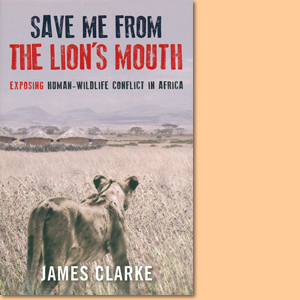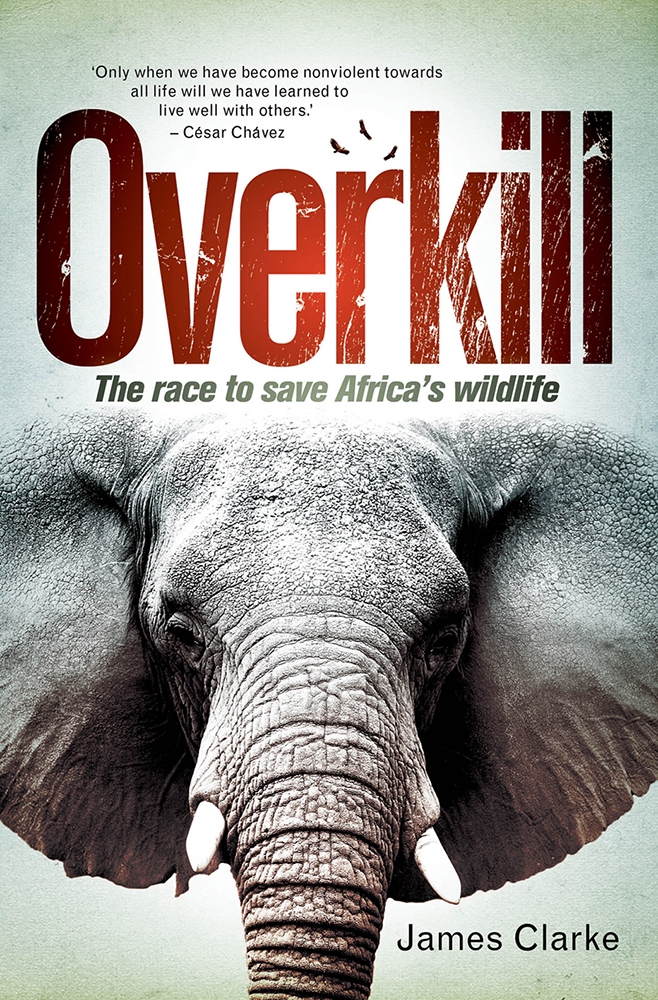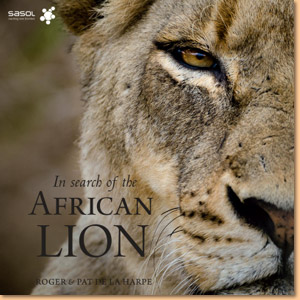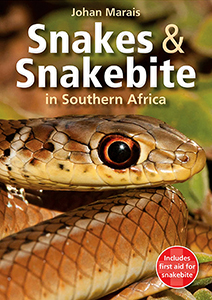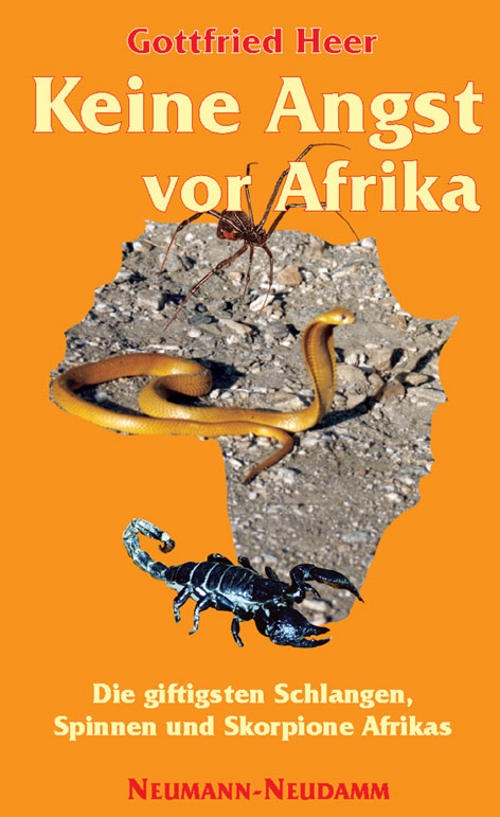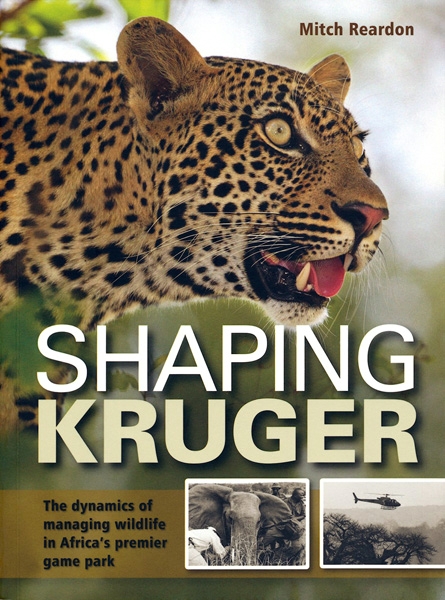Save me from the Lion's Mouth: Exposing Human-Wildlife Conflict in Africa, by James Clarke
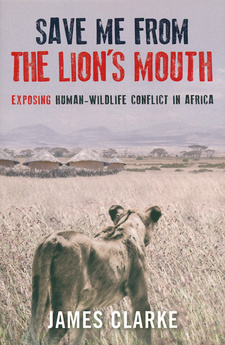
Save me from the Lion's Mouth: Exposing Human-Wildlife Conflict in Africa, by James Clarke. Struik Nature; Random House Struik
Save Me From the Lion's Mouth investigates the increasing conflict between people and wildlife in Africa and what needs to be done about it. James Clarke describes the human suffering and perceptions of those who live outside the reserve fences among man-eaters and marauders yet are excluded from the economic benefits accruing from the wildlife around them.
Those who study human evolution in Africa ponder how the diminutive apemen and early humans, fangless and clawless and, one imagines, lacking in fleetness of foot, survived and eventually flourished in the African savanna. After all, the grassland was picked over by huge sabre-toothed cats; its waterways were ruled by crocodiles and hippopotamuses and the veld was the ancient domain of heavyweights such as the elephant, rhinoceros and buffalo. Our naked ancestors appear to have been singularly ill-equipped for survival in Africa of all places. Yet that is where humanity began. Since the 1960s I have taken an interest in Africa's wildlife and in its fossil-rich regions with their unique opportunities for the study of human evolution. This resulted in my first book, Man is the Prey, which was an investigation into the methods and motives of man's natural enemies. More than forty years on I am still collecting data but years ago the angle of my interest diversified: I began to look at the impact of wild animals on the day-to-day lives of millions of people and the sad fact that, right across sub-Saharan Africa, many people 'fear and detest' elephants and lions. They look upon wildlife as either edible or dangerous. Indeed, throughout much of the region, the all-encompassing word for wildlife is nyama: meat. A gulf in understanding has been allowed to develop between those who live in the wilds and those who, laudably, want to assure the survival of Africa's amazing variety of wildlife. It must be borne in mind that 80 per cent of Africa's wild animals live outside game reserves. Wildlife and humans are competing for the same habitat, with serious losses on both sides. The people don't deserve it. Neither do the animals. The antagonism between humans and wild animals is particularly pronounced on the eastern side of the continent, which is by far the world's most hazardous rural environment for humans. Yet this eastern side is precisely where humans evolved. Somehow our much smaller pre-human ancestors, with brains a third of the size of ours, not only survived but thrived in an environment 'bristling with menace'. Wildlife television programmes and their depiction of the African wilds and the creatures that inhabit them tend to give the false impression that elephants are friendly creatures (while they are indeed noble beasts, they are at best indifferent to our presence), and that you can cuddle lions and make pets of hyaenas. The hippo is often seen as a rotund comical character, when in fact it is the most unhumorous animal God ever created. Few programmes, brilliant though many of them are, focus on the reality of rural Africa or help us empathise with those who live every day with wild animals as neighbours, and who not only lose livestock and crops to wild animals, but who also lose loved ones and neighbours to them. Annually, throughout Africa, many thousands of deaths are caused by lions, leopards, hyaenas, crocodiles, elephants, hippopotamuses, rhinoceroses and buffalo, and tens of thousands are killed a year by snakes, according to the WHO. I am not suggesting that Africa is one giant Jurassic Park or that all of wild Africa is traumatised by wild animals, but there is a continuity of deaths in many regions that has been unceasing since the very beginning of humankind. Today, for various reasons, the situation poses a challenge to all who call themselves conservationists, since it might ultimately threaten the continuance of Airica's great game reserves. (...)
This is an excerpt from the book: Save me from the Lion's Mouth: Exposing Human Wildlife Conflict in Africa, by James Clarke.
Title: : Save me from the Lion's Mouth
Subtitle: Exposing Human Wildlife Conflict in Africa
Author: James Clarke
Publisher: Struik Nature; Random House Struik
Cape Town, South Africa 2012
ISBN 9781920544751 / ISBN 978-1-920544-75-1
Softcover, 15x22 cm, 200 pages
Clarke, James im Namibiana-Buchangebot
Save me from the Lion's Mouth: Exposing Human-Wildlife Conflict in Africa
Save Me From the Lion's Mouth investigates the increasing conflict between people and wildlife in Africa.
Overkill: The Race To Save Africa's Wildlife
Overkill: The Race To Save Africa's Wildlife describes the history and extent of human impact on the worlds wildlife.
Like it was. The Star 100 Years in Johannesburg 1887-1987
Like it was is a tremendous, most interesting collection of representable newspaper publication of the South Africa newspaper 'THE STAR' through 100 years from 1887 to 1987.
Weitere Buchempfehlungen
In Search of the African Lion
In Search of the African Lion focuses on four main areas: the Kalahari, the Madikwe/Mapungubwe area, the Greater Kruger National Park and Northern Zululand.
Snakes & snakebite in Southern Africa
This guide is an uncomplicated approach to snakes and snakebites in Southern Africa, the emphasis is on identification, and on first aid treatment of snakebites.
Keine Angst vor Afrika
Ein reich bebilderter Notfallratgeber bei Schlangen- und Spinnenbissen für Touristen und Tourguides
Shaping Kruger: The Dynamics of Managing Wildlife in Africa's Premier Game Park
Shaping Kruger: The Dynamics of Managing Wildlife in Africa's Premier Game Park provides fascinating insight into the lives, habits and behaviour of the larger animals that significantly affect the workings of the park.

